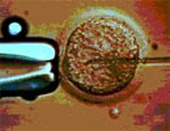Frozen eggs fertilize in vitro as well as regular eggs
Women for certain reasons of having to send frozen eggs now have a chance to get pregnant as much as those who use fresh eggs when in vitro fertilization.
 Photo: manbir-online Improvements in "low-temperature conservation" techniques have almost eliminated the problem of ice crystal formation and destruction of egg structure - a major obstacle to traditional cryogenic technology. . The new results show that these improvements have resulted in conception rates almost equal to in vitro fertilization with fresh eggs.
Photo: manbir-online Improvements in "low-temperature conservation" techniques have almost eliminated the problem of ice crystal formation and destruction of egg structure - a major obstacle to traditional cryogenic technology. . The new results show that these improvements have resulted in conception rates almost equal to in vitro fertilization with fresh eggs.
Masashige Kuwayama from Kato Ladies Hospital in Tokyo, Japan developed a technique called Cryotop. Accordingly, people release frozen eggs into a solution, before cooling them in liquid nitrogen. In traditional cryogenic technology, eggs will come in contact with protective chemicals and be cooled slowly for several hours.
In the experiment, Kuwayama froze 111 eggs, of which 94.5% survived after thawing. They are fertilized by injecting sperm into the cytoplasm and 29 embryos produced among them have been implanted in women. The result was 12 pregnant women - the success rate was 41.9% compared to 42.5% when using fresh eggs. Eleven healthy babies were born, including a twins, and two pregnancies.
The results were presented at the conference of European Embryo and Breeding Association in Prague, Czech Republic, yesterday.
" This is a big improvement. Previously, hundreds of frozen ovules were born by only one baby, now this rate has increased 10 times, " said Arne Sunde, former president of the Association.
Traditional cryogenic methods have been used to store human embryos and eggs since the 1980s, but so far only about 150 babies have been born from those eggs around the world.
In another work, Canadian researchers have shown that eggs can be photographed to detect chromosomal abnormalities, in order to increase the success rate of IVF techniques.
T. An
- Why do Americans put eggs in refrigerators and Europeans?
- When should I do in vitro fertilization?
- IVF fertilization with frozen eggs is difficult to succeed
- Can we store eggs by freezing?
- Raising young eggs to cure female infertility
- New method to choose healthy eggs
- Twins due to frozen sperm for 26 years
- Things to know about in vitro fertilization
- It is possible to give birth without a mother's egg
- The baby was born 16 years old
- Protein discovery decides to conceive successfully
- Vietnam successfully created eggs rich in Omega-3 eggs
 Green tea cleans teeth better than mouthwash?
Green tea cleans teeth better than mouthwash? Death kiss: This is why you should not let anyone kiss your baby's lips
Death kiss: This is why you should not let anyone kiss your baby's lips What is salmonellosis?
What is salmonellosis? Caution should be exercised when using aloe vera through eating and drinking
Caution should be exercised when using aloe vera through eating and drinking